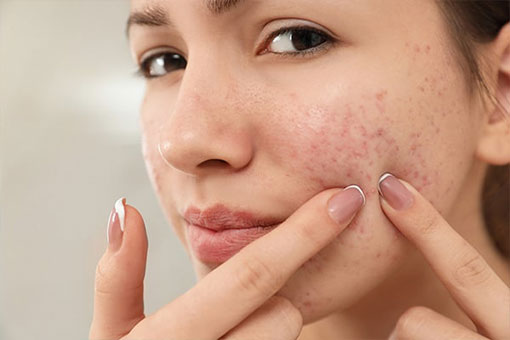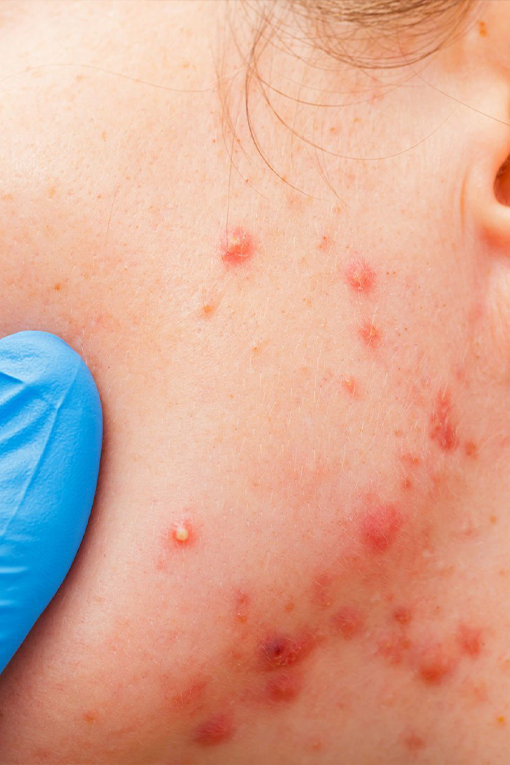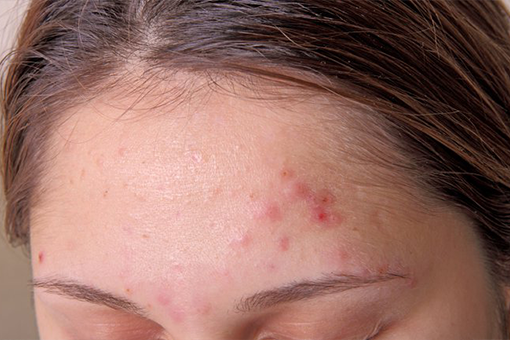Expert Cosmetics Since 2017
Choice of Five-Star Clinics
Friendly and Knowledgeable Team
Acne
Acne is a condition that is caused when the pores and hair follicles within the skin get blocked. Dealing with acne by itself is difficult enough, as a number of young adults going through puberty will tell you, but the scarring that can be associated with acne can leave you aimlessly looking for an end to the problem.
The severity of the acne that is present will directly affect the type of treatment that you are able to receive. Generally, acne severity falls into three different and distinct categories;
- Mild – mild acne is categorised as mostly whiteheads and blackheads, with a small number of papules and pustules
- Moderate – moderate acne generally has more widespread whiteheads and blackheads, with more papules and pustules visible on the skin
- Severe – severe acne is where there are lots of large and sometimes painful papules and pustules on the skin, sometimes leading to cysts, and can also have some form of scarring present
What causes acne?
There are a number of things that can cause acne, ranging from hormonal changes to environmental causes. Acne happens when the pores of the skin get blocked up by dead skin, oil and bacteria, causing the skin to become irritates and leads to breakouts. The pores are the opening to your hair follicles and contain the sebaceous gland.
This gland is responsible for producing a substance known as sebum which keeps your skin from drying out, but with acne it produces too much. The sebum mixes together with the dead skin cells and causes a blockage within the follicle which, depening on how close to the surface it is, can show up as acne. If the blockage gets affect by any bacteria, this can affect the severity of the acne.


How is acne characterised?
Acne has a number of points that are distinct characterisations, which are;
Whiteheads
White heads generally have a yellow or white appearance and are filled with pus that is either solid or liquid in consistency.
Blackheads
Blackheads appear as small bumps on the skin and are clogged follicles beneath the pores that get their name from their appearance on the skin.
Papules
Papules appear on the skin as sowllen red areas that are generally what people tend to associate with a standard acne breakout.
Pustules
Pustules are similar to papules but contain fluid or pus, appearing on the skin as a white bump surrounded by red or swollen skin.
Nodules
Nodules are classified as raised lump of soft tissue beneath the skin that is filled with fluid
Cysts
Cysts appear as large red breakouts the are deep in the skin and painful to touch. They’re caused when bacteria gets trapped beneath the skin, which causes the swelling and pain.
How is acne characterised?
Acne has a number of points that are distinct characterisations, which are;
Whiteheads
White heads generally have a yellow or white appearance and are filled with pus that is either solid or liquid in consistency.
Blackheads
Blackheads appear as small bumps on the skin and are clogged follicles beneath the pores that get their name from their appearance on the skin.
Papules
Papules appear on the skin as sowllen red areas that are generally what people tend to associate with a standard acne breakout.
Pustules
Pustules are similar to papules but contain fluid or pus, appearing on the skin as a white bump surrounded by red or swollen skin.
Nodules
Nodules are classified as raised lump of soft tissue beneath the skin that is filled with fluid
Cysts
Cysts appear as large red breakouts the are deep in the skin and painful to touch. They’re caused when bacteria gets trapped beneath the skin, which causes the swelling and pain.

What acne treatments are available?
At Better Body Cosmetic Group, we are proud to offer a range of different treatment options for a number of acne conditions. During a consultation with a member of our team, we will be able to analyse your skin and work out what the best course of action is for you. We’re aware that the issues related to acne are more than just skin deep and are happy to advise on options and solutions that are available for you.
If you’re looking to make a change to your skin and fight the symptoms and results of acne or acne scarring, get in touch with us today to begin the transformation to having clearer and smoother skin.

Speak to an expert today
Give us a call or fill in our easy to use online form and a member of our customer support team will be in touch with you at a time and date that works best for you.
Frequently Asked Questions
What can cause acne?
It’s tricky to pin down exactly what causes acne as there can be a number of different factors that do it. Acne can be hereditary, it can be caused my medication, it can happen during puberty, acne can even be caused by wearing specific clothing (such as a headband) that puts pressure on a specific area of the skin. It’s also thought that smoking can cause acne in older people as well.
However, no matter what the underlying issue is, acne is always the product of follicles becoming blocked by sebum and dead skin cells. Once they are blocked up, they can turn into blackheads or whiteheads and can even go as far as turning into cysts (if they get infected by bacteria).
What ages is acne at it's worst?
Whilst acne is something that can affect people of all ages, it tends to have the strongest effect on adolescents between the ages of 12 and 24 (when the body tends to be going through, or has recently gone through, puberty). It also tends to affect girls at an earlier age than it affects boys.
Does acne go away by itself?
For the majority of those who will suffer with it, acne will tend to go away by itself once puberty has ended, but some people will still struggle with it as adults. The good news is that almost all acne (and the scarring associated with it) can be treated successfully, it’s just a matter of finding the best treatment for your skin.
How can I stop acne breakouts?
Acne is caused by dead skin cells and sebum blocking hair follicles and triggering a breakout, so the easiest and simplest way to avoid acne is to properly wash your face. It’s really important to remove any dirt, sweat and excess oils from the skin as these will contribute to the pores being blocked.
Can stress cause acne?
Stress and acne are often considered to go hand in hand, but their exact relationship is considered to be misunderstood. Stress isn’t something that can cause acne to appear, but if you are already suffering with acne that stress can actually make it worse.
Or call our team to arrange your consultation today:
- 0800 772 0039
View our latest news
The Fascinating Evolution of Cosmetic Surgery: A Journey Through Time
When we think of cosmetic surgery today, the images that often come to mind are those of celebrities with perfectly chiseled features or individuals undergoing transformative procedures for a rejuvenated appearance. However, the art and science of altering the human...
Stay connected




